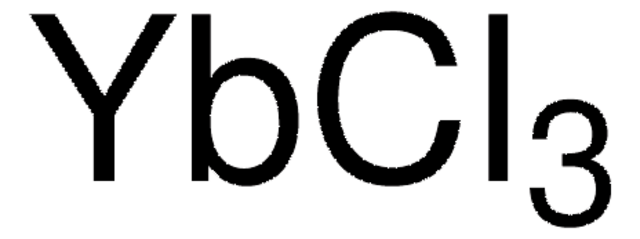450103
Yttrium(III) chloride
AnhydroBeads™, −10 mesh, 99.99% trace metals basis
Synonym(s):
Yttrium trichloride
About This Item
Recommended Products
product line
AnhydroBeads™
Quality Level
Assay
99.99% trace metals basis
impurities
≤150.0 ppm Trace Rare Earth Analysis
particle size
−10 mesh
mp
721 °C (lit.)
density
2.67 g/mL at 25 °C (lit.)
SMILES string
Cl[Y](Cl)Cl
InChI
1S/3ClH.Y/h3*1H;/q;;;+3/p-3
InChI key
PCMOZDDGXKIOLL-UHFFFAOYSA-K
Looking for similar products? Visit Product Comparison Guide
Application
Features and Benefits
Legal Information
accessory
Signal Word
Danger
Hazard Statements
Precautionary Statements
Hazard Classifications
Aquatic Acute 1 - Aquatic Chronic 1 - Eye Dam. 1 - Skin Sens. 1B
Storage Class Code
13 - Non Combustible Solids
WGK
WGK 3
Flash Point(F)
Not applicable
Flash Point(C)
Not applicable
Personal Protective Equipment
Certificates of Analysis (COA)
Search for Certificates of Analysis (COA) by entering the products Lot/Batch Number. Lot and Batch Numbers can be found on a product’s label following the words ‘Lot’ or ‘Batch’.
Already Own This Product?
Find documentation for the products that you have recently purchased in the Document Library.
Customers Also Viewed
Our team of scientists has experience in all areas of research including Life Science, Material Science, Chemical Synthesis, Chromatography, Analytical and many others.
Contact Technical Service














![Tris[N,N-bis(trimethylsilyl)amide]yttrium](/deepweb/assets/sigmaaldrich/product/structures/867/983/5b7cb7cd-8879-49e4-a9d7-29c52aaa82a0/640/5b7cb7cd-8879-49e4-a9d7-29c52aaa82a0.png)

